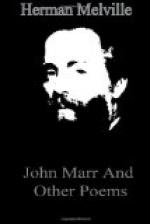Supposing a happy issue out of present perplexities, then, in the generation next to come, Southerners there will be yielding allegiance to the Union, feeling all their interests bound up in it, and yet cherishing unrebuked that kind of feeling for the memory of the soldiers of the fallen Confederacy that Burns, Scott, and the Ettrick Shepherd felt for the memory of the gallant clansmen ruined through their fidelity to the Stuarts—a feeling whose passion was tempered by the poetry imbuing it, and which in no wise affected their loyalty to the Georges, and which, it may be added, indirectly contributed excellent things to literature. But, setting this view aside, dishonorable would it be in the South were she willing to abandon to shame the memory of brave men who with signal personal disinterestedness warred in her behalf, though from motives, as we believe, so deplorably astray.
Patriotism is not baseness, neither is it inhumanity. The mourners who this summer bear flowers to the mounds of the Virginian and Georgian dead are, in their domestic bereavement and proud affection, as sacred in the eye of Heaven as are those who go with similar offerings of tender grief and love into the cemeteries of our Northern martyrs. And yet, in one aspect, how needless to point the contrast.
Cherishing such sentiments, it will hardly occasion surprise that, in looking over the battle-pieces in the foregoing collection, I have been tempted to withdraw or modify some of them, fearful lest in presenting, though but dramatically and by way of poetic record, the passions and epithets of civil war, I might be contributing to a bitterness which every sensible American must wish at an end. So, too, with the emotion of victory as reproduced on some pages, and particularly toward the close. It should not be construed into an exultation misapplied—an exultation as ungenerous as unwise, and made to minister, however indirectly, to that kind of censoriousness too apt to be produced in certain natures by success after trying reverses. Zeal is not of necessity religion, neither is it always of the same essence with poetry or patriotism.
There are excesses which marked the conflict, most of which are perhaps inseparable from a civil strife so intense and prolonged, and involving warfare in some border countries new and imperfectly civilized. Barbarities also there were, for which the Southern people collectively can hardly be held responsible, though perpetrated by ruffians in their name. But surely other qualities—exalted ones—courage and fortitude matchless, were likewise displayed, and largely; and justly may these be held the characteristic traits, and not the former.
In this view, what Northern writer, however patriotic, but must revolt from acting on paper a part any way akin to that of the live dog to the dead lion; and yet it is right to rejoice for our triumphs, so far as it may justly imply an advance for our whole country and for humanity.




